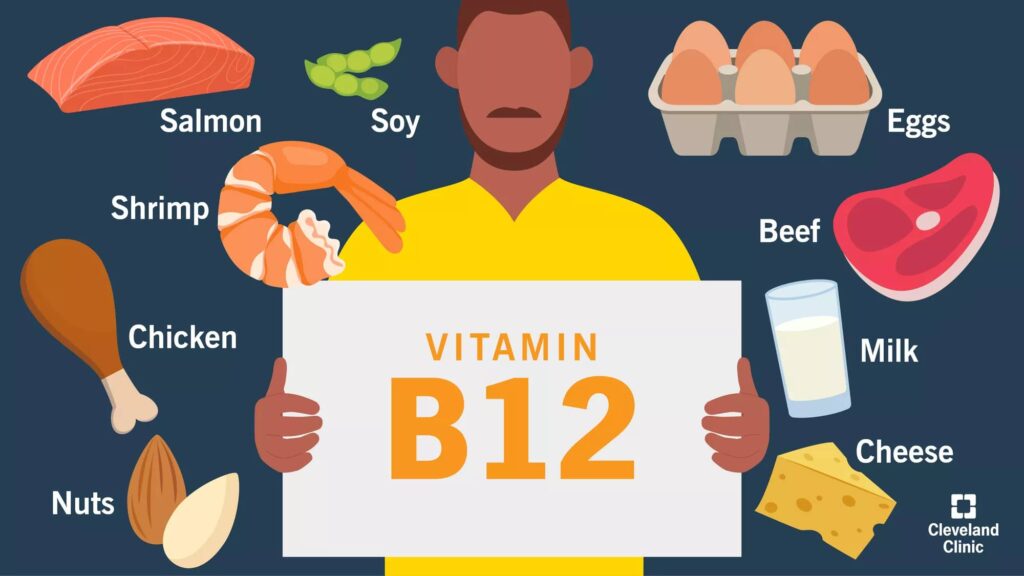Vitamins play a vital role in our well-being, and one that often gets overlooked is Vitamin B12. This water-soluble vitamin is essential for maintaining nerve function, producing DNA, and supporting red blood cell production. While many of us are aware of the basic benefits of vitamins, there’s often confusion around what makes Vitamin B12 so special and crucial to our health.

What Is Vitamin B12?
Cobalamin, another name for vitamin B12, is a water-soluble member of the B-vitamin family. Unlike other B-vitamins, B12 has a more complex chemical structure, which includes a metal ion—cobalt—at its core. This unique composition makes B12 one of the largest and most structurally complicated vitamins, and it’s essential for various biochemical processes in the human body.
Chemical Structure and Forms of Vitamin B12
B12 exists in several different forms, each with a slightly different chemical structure but the same fundamental benefits. The four main forms are:
Methylcobalamin – A biologically active form of B12 that plays a critical role in DNA synthesis and nerve function.
Adenosylcobalamin – Another active form found primarily in the mitochondria of cells, helping to produce energy.
Cyanocobalamin – A synthetic form often found in supplements and fortified foods; it is converted into active forms inside the body.
Hydroxocobalamin – A natural form of B12 produced by bacteria; it’s commonly used in injections and has longer-lasting effects in the bloodstream.
The Role of Vitamin B12 in the Body
Vitamin B12 is indispensable for several biological functions. From the formation of red blood cells to neurological health, here are the main processes in which B12 plays a crucial role:
1. Red Blood Cell Formation
One of the most important roles of Vitamin B12 is its involvement in red blood cell production. B12 helps in the development and maturation of red blood cells in the bone marrow. Without adequate B12, red blood cells become larger than normal and cannot move out of the bone marrow, leading to a condition known as megaloblastic anemia. This results in less oxygen being delivered to the body’s tissues, causing symptoms like fatigue and weakness.
2. DNA Synthesis
DNA, the genetic material present in every cell, requires B12 for proper synthesis. Specifically, B12 aids in the conversion of homocysteine to methionine, which is crucial for producing DNA. Without sufficient B12, DNA synthesis becomes faulty, which can contribute to cell damage and impaired tissue repair.
3. Neurological Function
B12 is also critical for maintaining the health of the myelin sheath, the protective covering that surrounds nerve fibers. This sheath acts as insulation, allowing electrical signals to travel efficiently between neurons. A deficiency in B12 can lead to nerve damage, causing neurological symptoms such as numbness, tingling, memory loss, and even cognitive decline.
4. Energy Metabolism
B12 helps convert fats and proteins into energy. It is involved in the metabolism of every cell in the body, primarily by assisting in the production of energy from the food we consume. When B12 levels are low, it can lead to feelings of fatigue and sluggishness, as the body struggles to generate energy efficiently.
Symptoms of Vitamin B12 Deficiency
Vitamin B12 deficiency can manifest in various ways, ranging from mild symptoms to severe and debilitating conditions. Unfortunately, because B12 deficiency can develop slowly over time, many people are unaware that their levels are low until the deficiency becomes severe.
1. Fatigue and Weakness
One of the earliest signs of B12 deficiency is persistent fatigue and weakness. Since B12 is essential for red blood cell production, low levels can impair oxygen delivery to the body’s tissues, leaving you feeling constantly tired.
2. Pale or Jaundiced Skin
B12 deficiency can cause a type of anemia called megaloblastic anemia, which results in the production of large, abnormal red blood cells that can’t function properly. This can lead to a pale complexion and in severe cases, jaundiced (yellow) skin due to the breakdown of these dysfunctional cells.
3. Numbness and Tingling
B12 plays an essential role in maintaining healthy nerves, so a deficiency can lead to paresthesia, which is characterized by sensations of numbness, tingling, or pins and needles, especially in the hands and feet. These symptoms arise because of damage to the myelin sheath surrounding nerves.
4. Cognitive Impairment
Vitamin B12 deficiency can significantly affect cognitive function, leading to issues with memory, thinking, and even mood disorders like depression. In severe cases, long-term B12 deficiency can contribute to the development of dementia.
5. Difficulty Walking or Balancing
Because of its role in nerve health, a lack of B12 can cause movement problems, such as difficulty walking, balance issues, and unsteady movements. This is due to the degeneration of the spinal cord’s nerves.
6. Shortness of Breath and Dizziness
Anemia caused by B12 deficiency can reduce the oxygen-carrying capacity of the blood, leading to shortness of breath and dizziness, especially after physical exertion.
7. Glossitis and Mouth Ulcers
Glossitis is the inflammation of the tongue, and it’s another common symptom of B12 deficiency. The tongue may become swollen, red, and painful. Mouth ulcers and a burning sensation in the mouth can also develop.
Worst-Case Scenario: Long-Term Effects of Vitamin B12 Deficiency
In the worst-case scenario, untreated Vitamin B12 deficiency can lead to irreversible damage to the body, affecting the nervous system and even the brain.
1. Severe Anemia
If B12 deficiency progresses unchecked, megaloblastic anemia can become severe, leading to extreme weakness, rapid heart rate, and even heart failure. In some cases, individuals may require blood transfusions to recover.
2. Neurological Damage
Chronic B12 deficiency can result in subacute combined degeneration of the spinal cord, a condition in which the spinal cord’s nerves are damaged. This can lead to permanent difficulties in walking, muscle weakness, and even paralysis.
3. Dementia and Cognitive Decline
Long-term B12 deficiency is associated with a higher risk of Alzheimer’s disease and other forms of dementia. The deficiency can cause irreversible damage to the brain, leading to memory loss, confusion, and cognitive decline.
Sources of Vitamin B12
The human body cannot produce Vitamin B12 on its own, so we must obtain it from dietary sources. Unlike many other vitamins, B12 is only found in significant amounts in animal-based products, which can make it difficult for vegetarians and vegans to get enough.
1. Animal-Based Foods
Meat: Beef, chicken, pork, and lamb are all excellent sources of B12.
Fish and Shellfish: Fish like salmon, tuna, and trout are rich in B12. Shellfish, especially clams, and crabs are among the top sources.
Dairy Products: Milk, cheese, and yogurt contain moderate amounts of B12.
Eggs: Particularly the yolks, are a good source, though they contain less B12 than meat and fish.
Organ Meats: Liver and kidney from animals, especially lamb, are extremely high in Vitamin B12.
2. Fortified Foods
For those who follow a vegetarian or vegan diet, fortified foods can help bridge the gap. Many plant-based products have added B12, including:
Fortified Breakfast Cereals: Many cereals, particularly those marketed as healthy or vegan-friendly, are fortified with B12.
Fortified Non-Dairy Milks: Almond, soy, and oat milk are often fortified with B12.
Nutritional Yeast: A popular ingredient in vegan cooking, often fortified with B12.
3. Supplements
If you struggle to get enough B12 from your diet, supplements can be an effective way to meet your needs. B12 supplements come in various forms:
Cyanocobalamin and Methylcobalamin: The two most common forms in supplements. Cyanocobalamin is synthetic, while methylcobalamin is more bioavailable but often more expensive.
Oral Tablets: The most common form of supplementation. These are effective, but absorption can vary.
Sublingual Tablets or Sprays: These dissolve under the tongue and are absorbed directly into the bloodstream, bypassing the digestive system.
Injections: B12 injections are often prescribed for individuals with severe deficiency or absorption issues.
Recommended Dosage and Ways to Consume Vitamin B12
The recommended daily allowance (RDA) of Vitamin B12 varies depending on age, gender, and specific health conditions. The RDA is generally set to ensure the prevention of deficiency, but individual needs may differ.
General Dosage Guidelines
Adults: The RDA for most adults is 2.4 micrograms per day.
Pregnant Women: During pregnancy, the recommended intake increases to 2.6 micrograms.
Breastfeeding Women: For lactating women, the RDA is 2.8 micrograms.
Older Adults: Those over 50 years of age are often advised to take supplements or eat fortified foods, as their ability to absorb B12 from natural sources may decline with age.
Special Cases
Vegans and Vegetarians: People who follow plant-based diets should consider fortified foods or supplements, as natural sources of B12 are predominantly animal-based.
People with Absorption Issues: Certain medical conditions (e.g., Crohn’s disease, celiac disease) or medications (e.g., metformin, proton pump inhibitors) can impair B12 absorption. These individuals may need higher doses or B12 injections.
Older Adults: As people age, stomach acid production decreases, which can reduce the absorption of B12 from food. Therefore, older adults are often encouraged to take supplements.
Conclusion
Vitamin B12 is vital for numerous bodily functions, from supporting energy production to ensuring the health of our nervous system and red blood cells. Despite its importance, many people, particularly vegetarians, vegans, and older adults, are at risk of deficiency. The good news is that B12 deficiency is preventable and treatable with the right diet, supplements, and medical advice. Always stay aware of your B12 levels and consult a healthcare professional if you suspect any issues.
Taking control of your Vitamin B12 intake is a small step that can make a huge difference in your overall health and well-being.
Frequently Asked Questions (FAQs)
1. Can Vitamin B12 deficiency be reversed?
Yes, Vitamin B12 deficiency can often be reversed if caught early. Treatment typically involves dietary changes or supplements. However, if the deficiency is severe or has persisted for a long time, some neurological damage may be irreversible.
2. Can you get too much Vitamin B12?
Since vitamin B12 is soluble in water, excess is often eliminated in the urine. Therefore, toxicity from B12 is extremely rare, even with high doses from supplements. However, always consult your doctor before taking high doses for an extended period.
3. How can vegetarians and vegans meet their Vitamin B12 needs?
Vegetarians and vegans can obtain Vitamin B12 through fortified foods, such as plant-based milks and cereals, or through supplements. It’s essential for those on a plant-based diet to monitor their B12 levels to prevent deficiency.
4. What is the best form of B12 supplement?
The best form of B12 depends on your needs. Methylcobalamin is considered the more bioavailable form, but cyanocobalamin is just as effective for most people and is more commonly found in supplements.
5. How long does it take to correct a B12 deficiency?
This depends on the severity of the deficiency and the treatment method. Oral supplements may take several weeks or months to restore normal levels, while B12 injections may work faster. Regular monitoring is essential to ensure the deficiency is being corrected.
Reference : http://www.webmd.com
Disclaimer : This article is for educational purposes only. Consult a medical practitioner before acting on the information provided herein.







